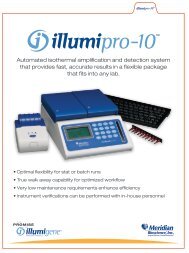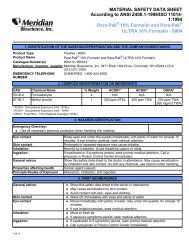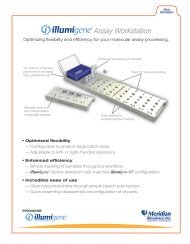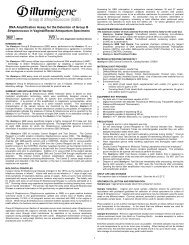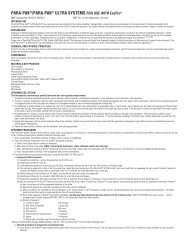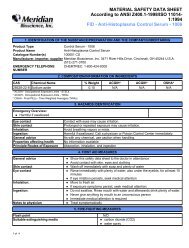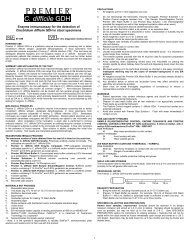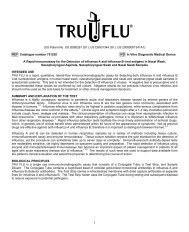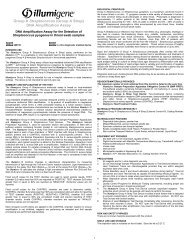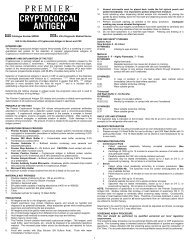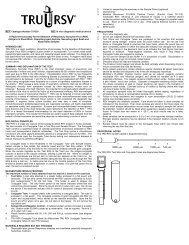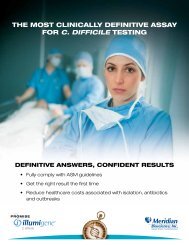GBS Answers - Meridian Bioscience, Inc.
GBS Answers - Meridian Bioscience, Inc.
GBS Answers - Meridian Bioscience, Inc.
You also want an ePaper? Increase the reach of your titles
YUMPU automatically turns print PDFs into web optimized ePapers that Google loves.
4 Tips<br />
<strong>GBS</strong><strong>Answers</strong><br />
For Moms Who Test Positive For <strong>GBS</strong><br />
Most Moms who test<br />
positive for Group B<br />
Strep will give birth<br />
to perfectly healthy<br />
babies, but that doesn’t<br />
mean they shouldn’t<br />
takes steps to protect<br />
their newborns from<br />
potentially serious<br />
illness, or even death.<br />
Doctors and real moms<br />
come together to<br />
share their best tips<br />
for handling a <strong>GBS</strong><br />
diagnosis.<br />
1<br />
Maintain an open dialogue<br />
with your doctor<br />
“My best tip for a woman who has tested<br />
positive is to discuss that result with her<br />
obstetrician,” says Dr. Carol J. Baker,<br />
professor of pediatrics at Baylor College<br />
of Medicine in Houston and executive<br />
director, Center for Vaccine Awareness &<br />
Research, Texas Children’s Hospital.<br />
Dr. Baker also advises women to have<br />
a clear plan for what will happen once<br />
they go into labor, and to be sure to be<br />
honest with their health care professionals.<br />
“People worry during pregnancy,”<br />
she says. “They wonder, ‘Am I eating<br />
the wrong thing? Am I drinking the right<br />
thing?’ The overwhelming majority of<br />
babies will be healthy whether they carry<br />
Group B Strep or not, so on one hand, I<br />
tell women not to worry; but on the other<br />
hand, if you want to know more—ask!”<br />
Think of the medical professionals you’ve<br />
surrounded yourself with as teammates<br />
in the quest for a happy, healthy birth.<br />
Trust them, of course, but don’t be afraid<br />
to seek second opinions, ask questions<br />
and do your own research.<br />
Support groups, both in-person and<br />
online, can bring comfort in community,<br />
and there are a plethora of reliable online<br />
resources, such as the CDC’s website—just<br />
make sure you’re turning to a<br />
trustworthy source.<br />
2<br />
Go to the hospital as<br />
soon as labor starts<br />
The sooner you get to the hospital, the<br />
sooner you can begin your antibiotic<br />
treatment (which should be administered<br />
intravenously). “Antibiotics to<br />
prevent <strong>GBS</strong> disease work best if given<br />
4 or more hours before the birth of the<br />
baby. Arriving to the hospital when labor<br />
is starting maximizes the chances that<br />
women can get this effective treatment<br />
in time,” explains Jonathan M. Wortham,<br />
MD, Epidemic Intelligence Service Officer<br />
for the Center for Disease Control, has<br />
taken care of extremely ill infants with<br />
<strong>GBS</strong> disease<br />
Of the mothers who test positive for <strong>GBS</strong><br />
and are treated with antibiotics in labor,<br />
the risk of infection drops from 1 in 200<br />
babies to 1 in 4,000.<br />
3<br />
Remind the hospital<br />
staff that you tested<br />
positive for <strong>GBS</strong> bacteria.<br />
Remember tip one? Trust your medical<br />
team, but you’re in charge of your own<br />
health. Don’t assume everyone has seen<br />
your files. Speak up and remind everyone<br />
you talk to, nurses included, that you<br />
tested positive for <strong>GBS</strong> bacteria, even if<br />
you think they already know.<br />
“We have a status card we give to Mom<br />
if she tests positive, just in case the results<br />
aren’t at the hospital in time for the<br />
delivery,” says Marti Perhach, executive<br />
director, CEO and co-founder of Group B<br />
Strep International. “She can show the<br />
card and expedite getting the IV antibiotics.<br />
She should also be sure to alert the<br />
nursing staff as soon as labor starts or<br />
her water breaks.”<br />
If you’re allergic to any medications, such<br />
as Penicillin, note that right away, too.<br />
4<br />
Ask your provider<br />
to not strip your<br />
membranes<br />
“The reason for that recommendation is<br />
that stripping the membranes can allow<br />
the bacteria to get closer to the baby,”<br />
explains Dr. Baker.<br />
11



